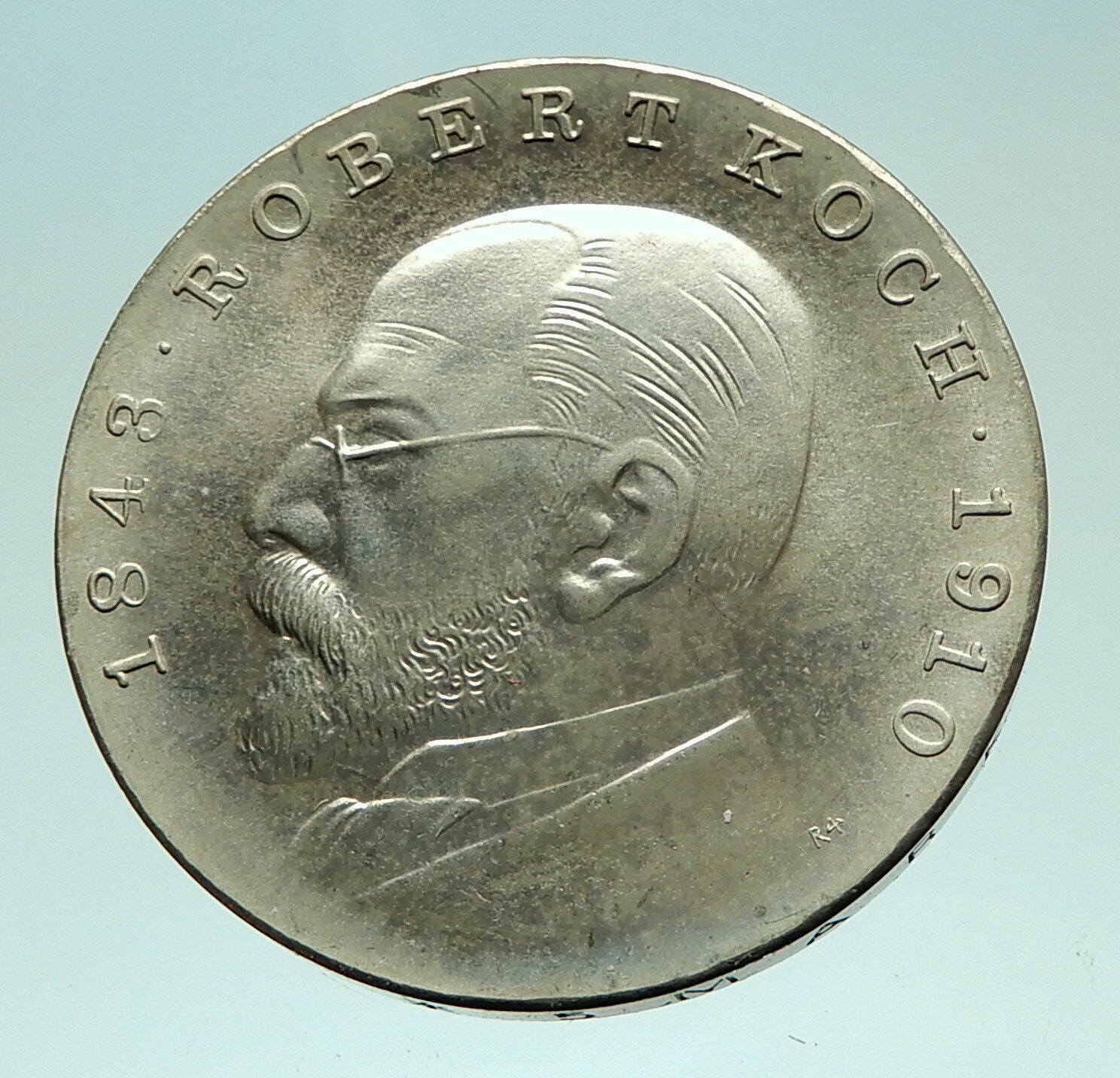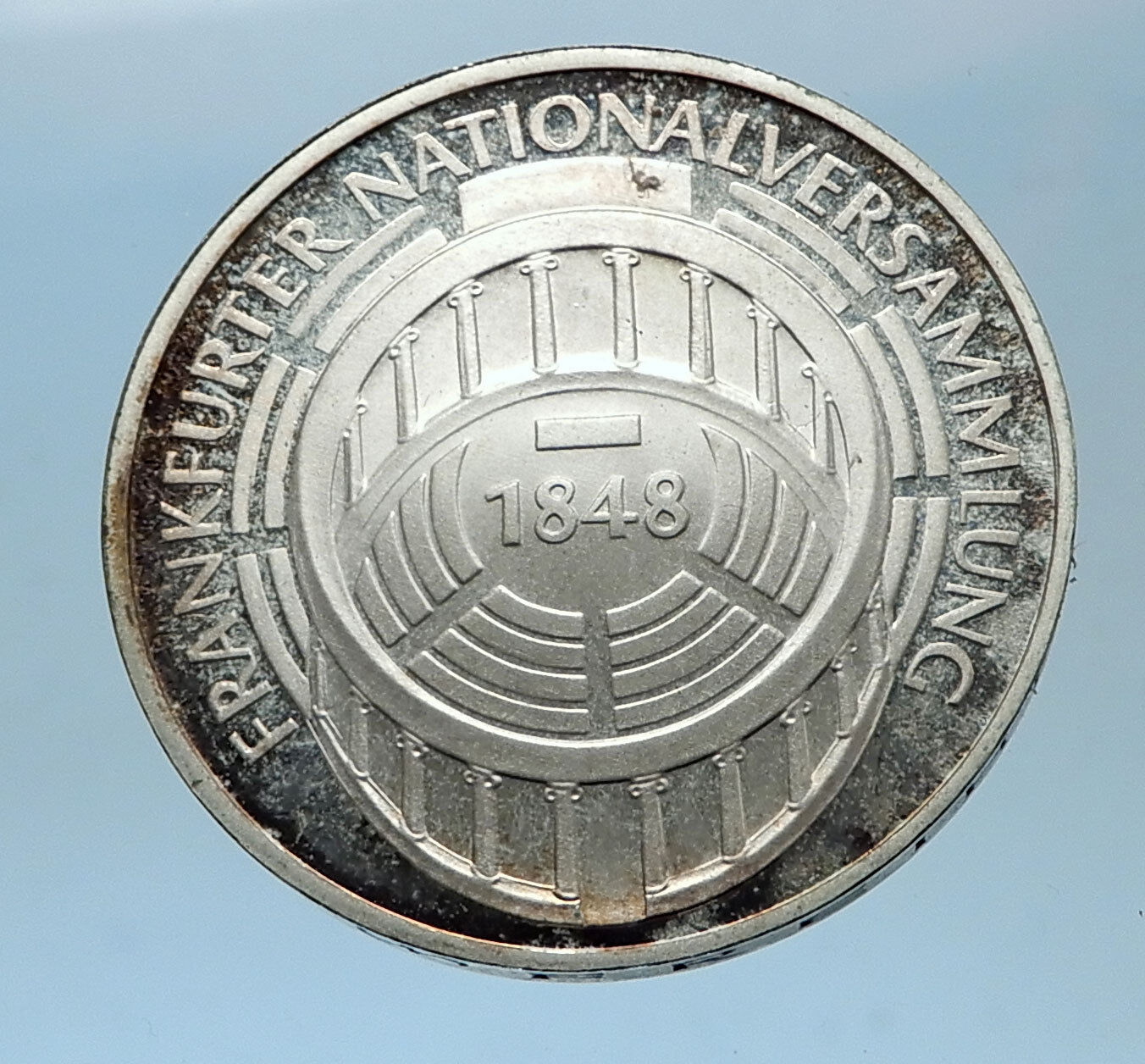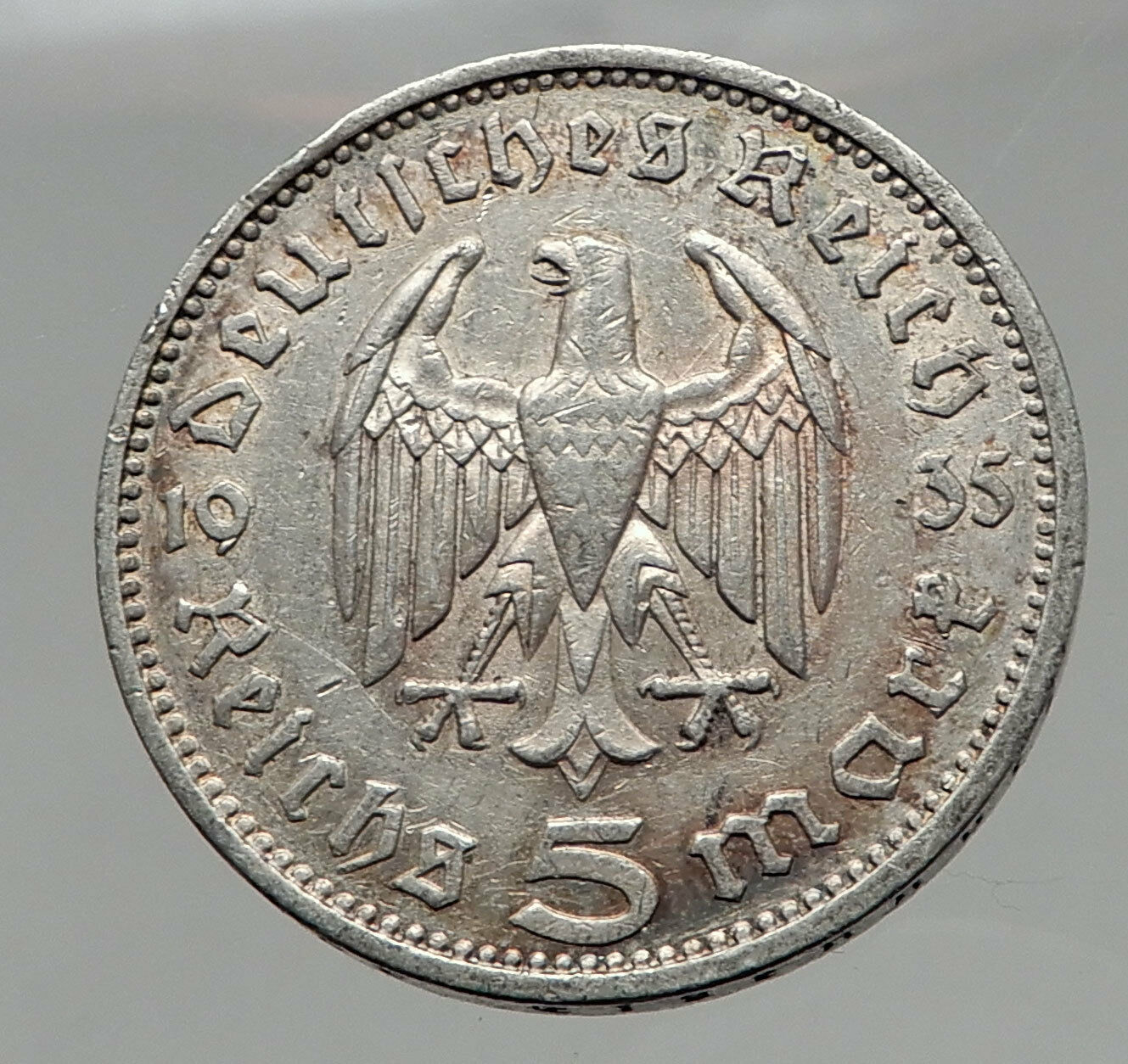|
Germany – 25th Anniversary – Federal Constitutional Law – Commemorative issue
1974 F Proof Silver 5 Mark 28mm (11.10 grams) 0.625 Silver (0.2251 oz. ASW)
Reference: KM# 138
BUNDESREPUBLIK DEUTSCHLAND ·5 DEUTSCHE MARK 19 74 F, Eagle of Germany.
1974 25 JAHRE GRUNDGESETZ DER BUNDESREPUBLIK DEUTSCHLAND 1949, Symbol of the 11 countries forming the Federal Republic.
Edge Lettering: DIE MENSCHENWÜRDE IST UNANTASTBAR
You are bidding on the exact item pictured, provided with a Certificate of Authenticity and Lifetime Guarantee of Authenticity.
 The Basic Law for the Federal Republic of Germany (German: Grundgesetz für die Bundesrepublik Deutschland) is the constitution of the Federal Republic of Germany. The Basic Law for the Federal Republic of Germany (German: Grundgesetz für die Bundesrepublik Deutschland) is the constitution of the Federal Republic of Germany.
The Basic Law was approved on 8 May 1949 in Bonn, and, with the signature of the occupying western Allies of World War II on 12 May, came into effect on 23 May. Its original field of application (German: Geltungsbereich) – that is, the states that were initially included in the Federal Republic of Germany – consisted of the three Western Allies’ zones of occupation, but at the insistence of the Western Allies, formally excluded West Berlin. In 1990, the Two Plus Four Agreement between the two parts of Germany and all four Allied Powers stipulated the implementation of a number of amendments. In the subsequent Unification Treaty of 1990, this amended Basic Law was adopted as the constitution of a united Germany.
The German word Grundgesetz may be translated as either Basic Law or Fundamental Law (Grund- is cognate with the English word ground). The term Verfassung (constitution) was deliberately avoided as the drafters regarded the Grundgesetz as an interim arrangement for a provisional West German state, expecting that an eventual reunified Germany would adopt a proper constitution, enacted under the provisions of Article 146 of the Basic Law, which stipulates that such a constitution must be “freely adopted by the German people”. Nevertheless, although the amended Basic Law would finally be approved in 1990 by all four Allied Powers (who thereby relinquished their continued reserved constitutional rights), it was never submitted to a popular vote, neither in 1949 nor in 1990.
The authors of the Basic Law sought to ensure that a potential dictator would never again be able to come to power in the country. Although some of the Basic Law is based on the Weimar Republic’s constitution, the authors also elevated human rights and human dignity to core values protected by the Basic Law. The principles of democracy, republicanism, social responsibility, and federalism are key components of the Basic Law; the principles and fundamental rights underlying these articles are constitutionally entrenched and; although several of these articles have since been reworded, extended or refined, they are barred from being removed or repealed by the normal amendment process.
 Germany, officially the Federal Republic of Germany, officially the Federal Republic of  Germany is a federal parliamentary republic in western-central Europe. It includes 16 constituent states and covers an area of 357,021 square kilometres (137,847 sq mi) with a largely temperate seasonal climate. Its capital and largest city is Berlin. With 81 million inhabitants, Germany is the most populous member state in the European Union. After the United States, it is the second most popular migration destination in the world. Germany is a federal parliamentary republic in western-central Europe. It includes 16 constituent states and covers an area of 357,021 square kilometres (137,847 sq mi) with a largely temperate seasonal climate. Its capital and largest city is Berlin. With 81 million inhabitants, Germany is the most populous member state in the European Union. After the United States, it is the second most popular migration destination in the world.
Various Germanic tribes have occupied northern Germany since classical antiquity. A region named Germania was documented before 100 CE. During the Migration Period the Germanic tribes expanded southward. Beginning in the 10th century, German territories formed a central part of the Holy Roman Empire. During the 16th century, northern German regions became the centre of the Protestant Reformation.
The rise of Pan-Germanism inside the German Confederation resulted in the unification of most of the German states in 1871 into the Prussian-dominated German Empire. After World War I and the German Revolution of 1918-1919, the Empire was replaced by the parliamentary Weimar Republic. The establishment of the Third Reich in 1933 led to World War II and the Holocaust. After 1945, Germany split into two states, East Germany and West Germany. In 1990, the country was reunified.
 In the 21st century, Germany is a great power and has the world’s fourth-largest economy by nominal GDP, as well as the fifth-largest by PPP. As a global leader in several industrial and technological sectors, it is both the world’s third-largest exporter and importer of goods. Germany is a developed country with a very high standard of living sustained by a skilled and productive society. It upholds a social security and universal health care system, environmental protection and a tuition free university education. In the 21st century, Germany is a great power and has the world’s fourth-largest economy by nominal GDP, as well as the fifth-largest by PPP. As a global leader in several industrial and technological sectors, it is both the world’s third-largest exporter and importer of goods. Germany is a developed country with a very high standard of living sustained by a skilled and productive society. It upholds a social security and universal health care system, environmental protection and a tuition free university education.
Germany was a founding member of the European Union in 1993. It is part of the Schengen Area, and became a co-founder of the Eurozone in 1999. Germany is a member of the United Nations, NATO, the G8, the G20, and the OECD. The national military expenditure is the 9th highest in the world. Known for its rich cultural history, Germany has been continuously the home of influential artists, philosophers, musicians, sportsmen, entrepreneurs, scientists and inventors.
|




 The Basic Law for the Federal Republic of Germany (German: Grundgesetz für die Bundesrepublik Deutschland) is the constitution of the Federal Republic of Germany.
The Basic Law for the Federal Republic of Germany (German: Grundgesetz für die Bundesrepublik Deutschland) is the constitution of the Federal Republic of Germany.  Germany, officially the Federal Republic of
Germany, officially the Federal Republic of  Germany is a federal parliamentary republic in western-central Europe. It includes 16 constituent states and covers an area of 357,021 square kilometres (137,847 sq mi) with a largely temperate seasonal climate. Its capital and largest city is Berlin. With 81 million inhabitants, Germany is the most populous member state in the European Union. After the United States, it is the second most popular migration destination in the world.
Germany is a federal parliamentary republic in western-central Europe. It includes 16 constituent states and covers an area of 357,021 square kilometres (137,847 sq mi) with a largely temperate seasonal climate. Its capital and largest city is Berlin. With 81 million inhabitants, Germany is the most populous member state in the European Union. After the United States, it is the second most popular migration destination in the world. In the 21st century, Germany is a great power and has the world’s fourth-largest economy by nominal GDP, as well as the fifth-largest by PPP. As a global leader in several industrial and technological sectors, it is both the world’s third-largest exporter and importer of goods. Germany is a developed country with a very high standard of living sustained by a skilled and productive society. It upholds a social security and universal health care system, environmental protection and a tuition free university education.
In the 21st century, Germany is a great power and has the world’s fourth-largest economy by nominal GDP, as well as the fifth-largest by PPP. As a global leader in several industrial and technological sectors, it is both the world’s third-largest exporter and importer of goods. Germany is a developed country with a very high standard of living sustained by a skilled and productive society. It upholds a social security and universal health care system, environmental protection and a tuition free university education.




